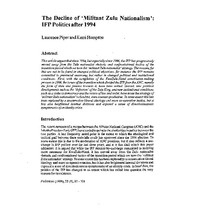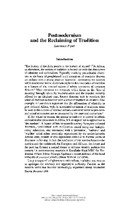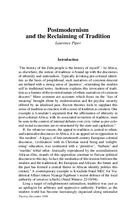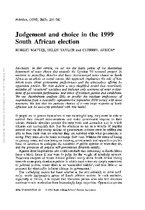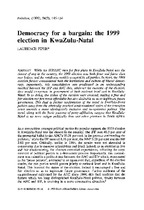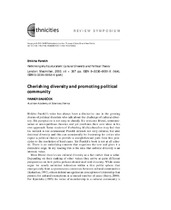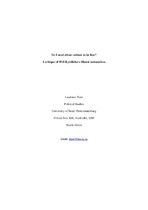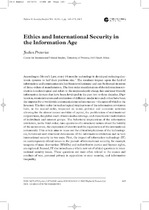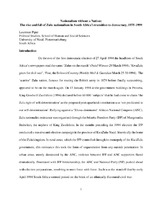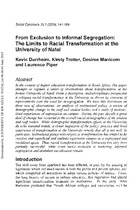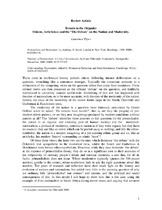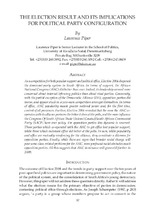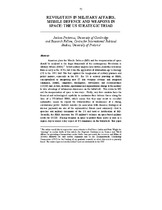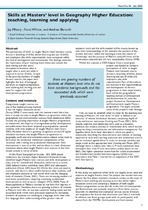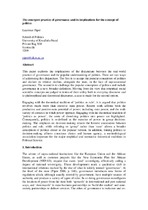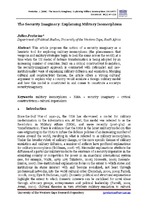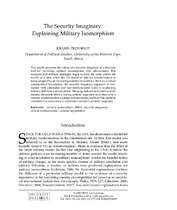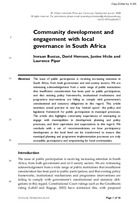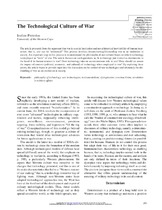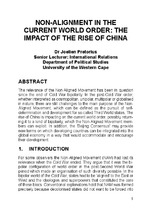Browsing Research Articles (Political Studies) by Issue Date
Now showing items 1-20 of 81
-
The decline of ‘militant Zulu nationalism’: IFP politics after 1994
(Taylor & Francis, 1998)Abstract This article argues that since 1994, but especially since 1996, the IFP has progressively moved away from the Zulu nationalist rhetoric and confrontational tactics of the transition period which we term the ... -
Postmodernism and the reclaiming of tradition
(Berghahn books, 1998)The history of the Zulu people is the history of myself'.1 In Africa, as elsewhere, the notion of tradition is bound up with the discourses of ethnicity and nationalism. Typically invoking pre-colonial identi- ties ... -
Postmodernism and the reclaiming of tradition
(Berghahn Books, 1998)‘The history of the Zulu people is the history of myself’.1 In Africa, as elsewhere, the notion of tradition is bound up with the discourses of ethnicity and nationalism. Typically invoking pre-colonial identities as ... -
Judgement and choice in the 1999 South African election
(Taylor & Francis, 1999)In this article, we set out the basic points of the theoretical framework of voter choice that underlie the Opinion '99 research project. In contrast to prevailing theories that have characterized voter choice in ... -
Democracy for a bargain: The 1999 election in KwaZulu‐Natal
(Taylor & Francis, 1999)While the IFP/ANC race for first place in KwaZulu-Natal was the closest of any in the country, the 1999 election was both freer and fairer than ever before, and the result was readily accepted by all parties. In short, ... -
Rethinking multiculturalism: Cultural diversity and political theory
(SAGE, 2001)Bhikhu Parekh’s voice has always been a distinctive one in the growing chorus of political theorists who talk about the challenge of cultural diversity. His perspective is not easy to classify. He criticizes liberal, ... -
Do I need ethnic culture to be free? A critique of Will Kymlicka's liberal nationalism
(AJOL, 2002)As part of a vigorous debate about the politics of multiculturalism, Will Kymlicka has sought to find grounds within liberal political theory to defend rights for cultural groups. Kymlicka argues that the individual's ... -
Ethics and international security in the information age
(Taylor & Francis, 2003)According to Moore’s Law, every 18 months technology is developed reducing electronic systems to half their previous size.1 The resultant impact upon the field of information and communication has been revolutionary and ... -
Nationalism without a nation: The rise and fall of Zulu nationalism in South Africa's transition to democracy, 1975-99
(WILEY, 2003)During South Africa’s transition from apartheid to democracy the most virulent opposition to change came from Zulu nationalism. Post‐apartheid, however, Zulu nationalism has largely waned. This is because Zulu nationalism ... -
From exclusion to informal segregation: The limits to racial transformation at the University of Natal
(Taylor & Francis, 2004)In the context of higher education transformation in South Africa, this paper attempts to capture a series of observations about transformation at the forme r University ofNatal. From a descriptive, multidisciplinary ... -
Return to the organic: Onions, artichokes and 'the debate' on the nation and modernity
(Berghahn Books, 2004)There exist in intellectual history periods where, following intense deliberation on a question, something like a consensus emerges. Typically the consensus amounts to a refinement of the competing views on the question ... -
The election result and its implications for political party configuration
(Sabinet, 2004)As a competition for both popular support and political office, Election 2004 deepened the dominant-party system in South Africa. In terms of support, the African National Congress (ANC) did better than ever. Indeed, its ... -
Revolution in military affairs, missile defence and weapons in space: The US strategic triad
(Faculty of Military Science, Stellenbosch University, 2005)American plans for Missile Defence (MD) and the weaponisation of space should be analysed in the larger framework of the contemporary Revolution in Military Affairs (RMA).1 Soviet military analysts have written about this ... -
Skills at masters’ level in Geography Higher E: Teaching, learning and applying
(Taylor & Francis, 2006)The perceptions of ‘skills’ at taught Master's level between course directors (teaching of skills), alumni (learning and use of skills) and employers (the skills requirements) were compared within the field of development ... -
The emergent practice of governance and its implications for the concept of politics
(AJOL, 2007)This paper explores the implications of the disjuncture between the real-world practice of governance and the popular understanding of politics. There are two ways of addressing this disjuncture. The first is to accept the ... -
The Security imaginary: Explaining military isomorphism
(Sage, 2008)This article proposes the notion of a security imaginary as a heuristic tool for exploring military isomorphism (the phenomenon that weapons and military strategies begin to look the same across the world) at a time ... -
The security imaginary: Explaining military isomorphism
(SAGE, 2008)This article proposes the notion of a security imaginary as a heuristic tool for exploring military isomorphism (the phenomenon that weapons and military strategies begin to look the same across the world) at a time when ... -
Community development and engagement with local governance in South Africa
(Elsevier, 2008)The issue of public participation is receiving increasing attention in South Africa, from both government and civil society sectors. We are witnessing acknowledgement from a wide range of public institutions that insufficient ... -
The technological culture of war
(SAGE, 2008)The article proceeds from the argument that war is a social institution and not a historical inevitability of human interaction, that is, war can be “unlearned.” This process involves deconstructing/dismantling war as an ... -
Non-alignment in the current world order. The impact of the rise of China
(Institute for Strategic Studies at the University of Pretoria, 2008)The relevance of the Non-Aligned Movement has been in question since the end of Cold War bipolarity. In the post-Cold War order, whether interpreted as cosmopolitan, unipolar, multipolar or globalised in nature, there are ...

